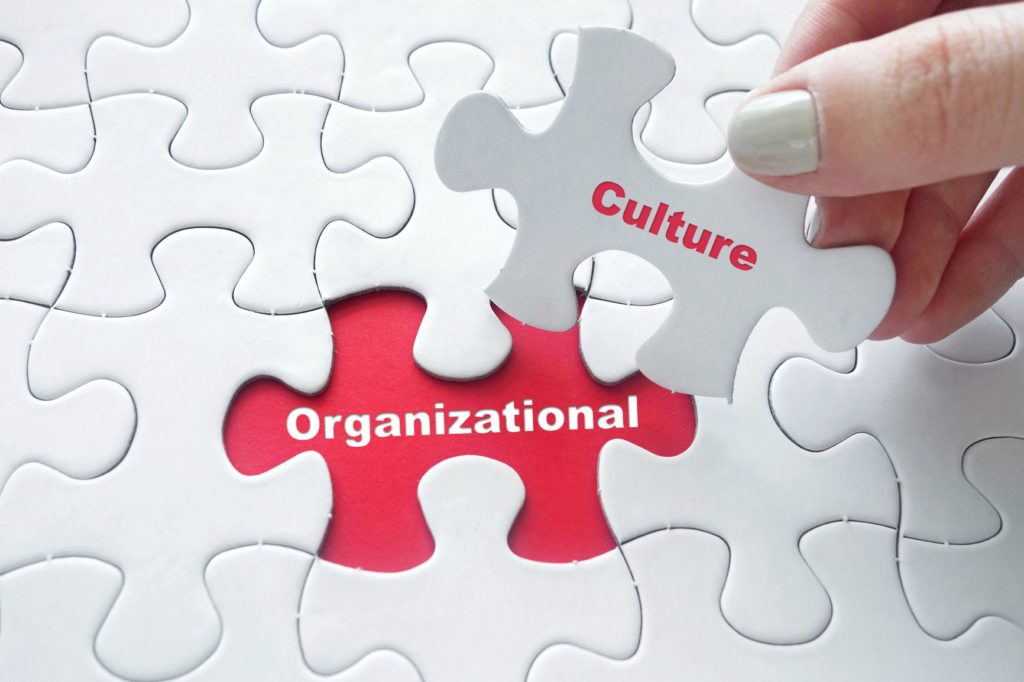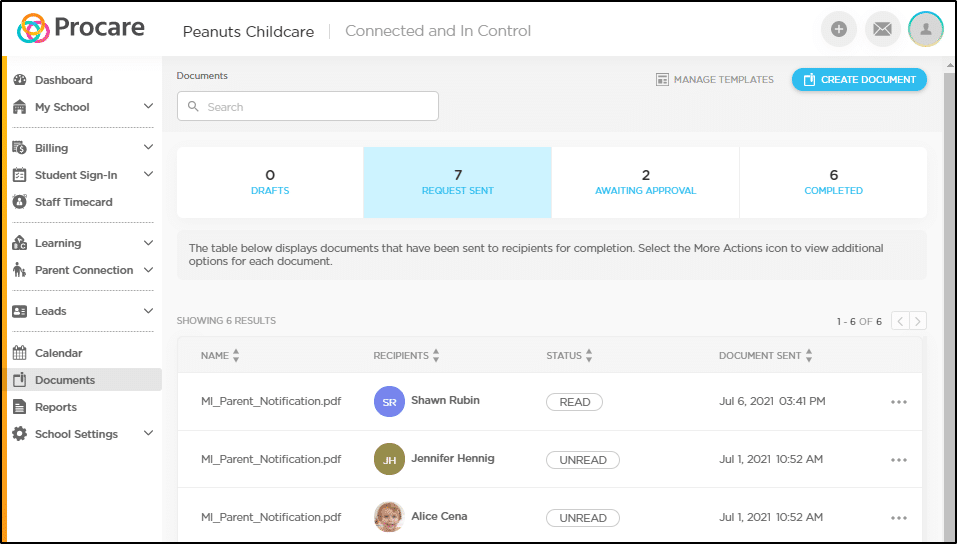
When you hear the term “organizational culture,” you probably think of boardrooms and business suits and not the local child care center down the street. But every organization, even your daycare, needs to build a strong, thriving culture.
So how do you do it?
Let’s take a look at what organizational culture is, why it’s important and how to build a strong organizational culture for your child care center in seven simple steps.
What is Organizational Culture?
Organizational culture is the combination of company values, goals, expected attitudes and daily practices that are exhibited by all members of your team.
In other words, it’s how and why your child care center does what it does.
Every daycare will have a different organizational culture. But all healthy cultures exemplify positive traits, while all unhealthy cultures exude negative ones. Your job is to build the former.
Why is Organizational Culture Important?
You may be thinking, “I own a small local business. Do I really need to learn how to build a strong organizational culture?” In a word: absolutely!
A strong company culture has three great benefits you should be aware of:
It Increases Engagement

According to Denison Consulting, companies with positive organizational cultures have 72% higher employee engagement ratings than those without.
Why is engagement important? Because engaged employees are more motivated and passionate about their work. This is crucial in difficult professions like child care where a lack of motivation and passion can easily lead to staff burnout.
It Improves Recruitment
Did you know that 35% of workers would pass on their dream job if the organizational culture wasn’t to their liking? The talented teachers you hope to hire won’t accept your job offer if they sense a dysfunctional culture.
And without quality teachers, you’ll have an extremely difficult time creating the fun, educational atmosphere that parents look for in top daycares.
It Reduces Staff Turnover
Lastly, a positive organizational culture won’t just help you recruit the best employees, it will help you keep them once they’re hired. Child care is difficult — rewarding, yes, but undeniably difficult. A great work environment can keep teachers going.
Hiring new employees is more expensive than retaining good staff. Keep in mind that 38% of employees want to leave their jobs because they don’t fit in or can’t stand the toxic culture. Unfortunately, constant turnover is an expense that most daycare centers can’t afford. Better to just improve your organizational culture and keep the team you have.
How to Build a Strong Organizational Culture
So how can you build a strong organizational culture? These seven steps can help you do just that.
1. Know Your Mission
What is your child care center trying to achieve? If your only answer is to make money, you need to dig deeper because that’s not a mission that your whole team can rally behind.
Here are a few mission examples to get you started with the brainstorming process:
- To provide high-quality education to preschoolers.
- To give parents peace of mind while they earn a living.
- To empower children to reach their full potential.
- To offer affordable child care to underprivileged kids in my community.
Once you understand your daycare’s central purpose, you need to capture it in a mission statement so that it can be shared with your staff. The best mission statements are clear, concise, specific, positive, inspirational and memorable.
2. Identify Your Values
Your employees want to be a part of something meaningful. How do you impart meaning to their work? You identify and promote specific values for them to uphold.
Only you can decide your daycare center’s values. Examples include integrity, honesty, trust, accountability, fun, passion and clear communication.
Once you’ve identified your values, you need to make sure that each of your employees — from the newly hired intern to the director of your newest location and everyone in between — believes in and works to uphold them at all times.
To help with this, consider creating a value statement (or adding values to the mission statement you created above) that you can distribute to your staff.
3. Hire the Right People

To build a strong organizational culture, you have to hire the right people. But this begs the question: what traits make up the “right” person for your child care center?
Refer back to your mission statement and company values. If your mission is to provide high-quality education to preschoolers, consider hiring employees with teaching experience. If your mission is to offer affordable child care to underprivileged kids in your community, hire team members who are devoted to that area.
Think about your core values, too. If you want to build your business on a foundation of integrity, accountability and clear communication, make sure new hires exhibit these traits.
And evaluate the personalities of all potential employees during the hiring process. Are they people you want to spend time with? Do their “vibes” mesh with those already on your team? The fit of each person you employ is essential to building a strong culture.
4. Communicate Clearly
When it comes to culture building, clear communication is key — and it starts at the top. As the leader of your team, it’s your job to communicate your daycare’s mission and values as well as the proper ways to do things.
Part of communicating is listening to the responses you receive.
Don’t just tell your employees what to do, ask them for advice and listen to their concerns. Then do something with that information. This will make your team feel valued and increase the likelihood that they’ll buy in and contribute to your culture.
And of course, parent communication is key. While parents won’t directly affect your corporate culture, they do play a role in its health.
It will be difficult for your employees to maintain positive attitudes if your customers are angry with them. Unsatisfied customers lower morale, which is tough on culture. Consider parent engagement tools offered by Procare to keep parents in the loop and happy.
Remember that it’s vital to communicate clearly with everyone — your staff and the parents your daycare serves — when learning how to build a strong organizational culture.
5. Motivate Your Team
It’s difficult to stay motivated at all times — especially in a challenging and tiring field like child care. When motivation plummets, culture usually follows. That’s why we suggest implementing gamification techniques to inspire your teachers when things get tough.
If you’re not familiar with the term, gamification refers to the “strategic attempt to enhance systems, services organizations and activities in order to create similar experiences to those experienced when playing games.”
By giving your employees rewards when they complete certain tasks or finish specific training modules, you’ll encourage them to do so. You can also stimulate friendly competition by doing a teacher of the month program with a fun and enticing prize.
6. Be Appreciative
Does your staff know you care about them? Do they feel appreciated for all of their hard work? You won’t be able to build a strong organizational culture for your child care business until the answer to both of these questions is a resounding yes.
Employees who don’t feel valued by the organizations they work for are prime candidates for turnover. And turnover is an expensive problem.
Fortunately, it’s not hard to show your appreciation. Simply thank your team on a regular basis and recognize them for their contributions. If you’re able, consider getting them small gifts on occasion. A gift card on their birthday or a small end-of-year bonus will go a long way toward making them feel like cherished members of your company.
Happy workers are essential to a thriving business culture, no matter what industry you’re in.
7. Accountability
All of the hard work you put into building positive organizational culture will be wasted if you don’t hold your team accountable. You need to make sure they live up to your daycare center’s mission statement and core values on a consistent basis.
When team members fail to do so, kindly remind them of your expectations to help them get back on track.
It’s important to remember that you must hold yourself accountable, too.
You are the leader of your organization. As such, your entire team looks to you to exemplify good behavior. Your company culture will always be subpar if you encourage your employees to do things that you aren’t willing to do yourself. So lead by example.
Better Culture, Better Daycare

When your employees have the right tools, they can serve your customers better. They’ll also be more productive and have fewer daily frustrations to deal with. These things will improve their general moods and help make your child care center a more enjoyable place to work.
Procare Solutions offers different software options to help child care centers manage operations with automation and engage with parents. Our new eDocuments feature gives the ability to send forms to be signed electronically, create an electronic signature, format documents and store signed documents in one central location.
And it can be done all within the Procare platform. Request your free demo of Procare today to see how software can aid you in creating a positive organizational culture!
Request a Demo
Request a demo and talk with one of our friendly Procare experts to get a tailored child care solution for the unique needs of your business.


